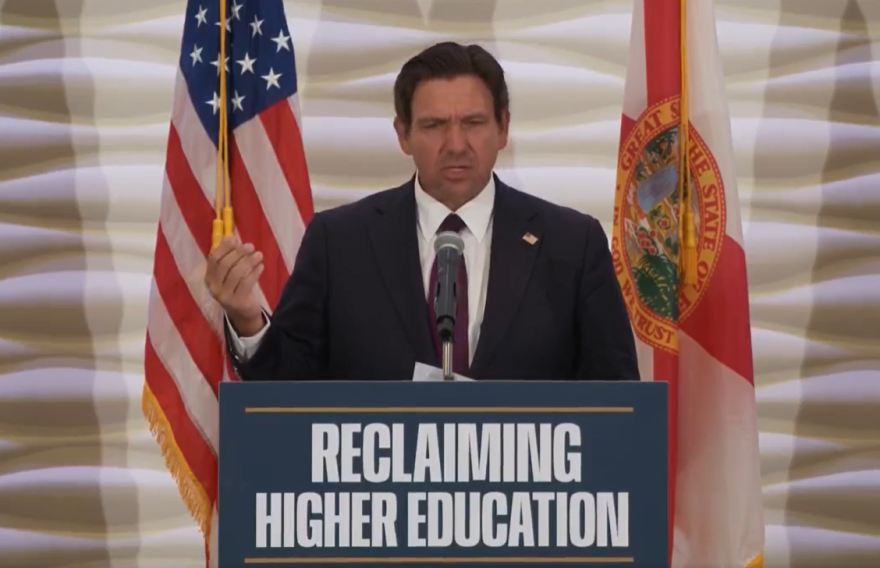At a news conference held at the University of South Florida's Tampa campus Wednesday, Gov. Ron DeSantis called on the state's higher education institutions to "pull the plug" on the use of H-1B visas.
The H-1B program allows employers to hire highly-skilled foreign professionals for jobs that are difficult to fill with U.S.-born workers.
However, DeSantis accused colleges and universities of abusing the program, saying they're using it to hire cheap foreign labor rather than qualified Americans.
"It's all become a total scam," DeSantis said.
He then questioned a number of faculty positions held by H-1B visa holders, including an assistant swim coach from Spain.
"Are you kidding me? We can't produce an assistant swim coach in this country?" he asked.
DeSantis then mentioned a University of Florida clinical assistant professor from the West Bank.
"A clinical assistant professor from supposed Palestine," DeSantis said, "Is that just social justice that they're doing?"
The governor's comments come after President Donald Trump criticized the H-1B program and introduced rule changes, which would likely restrict the number of visa-holders.
New H-1B applications, which previously cost employers between $2,000 to $5,000, would require a fee of $100,000. The Trump administration clarified the new fee does not apply to visas issued prior to Sept. 21, visa renewals, or visa-holders traveling in and out of the United States.
In Florida, more than 7,200 people are employed on an H-1B visa for fiscal 2025, according to data from the U.S. Citizenship and Immigration Services.
Under educational services, there are 677 H-1B holders in the state, topped by the University of Florida, with 156 H-1B visa holders.
The University of Miami, a private school, has 90, followed by the University of South Florida with 68 and Florida State University with 67.
Colleges and universities are currently exempt from the 85,000 annual cap on visa petitions.
Speaking at the news conference, University of Florida interim president Donald Landry called H-1B a "complex issue" and said he endorsed a review of the program at universities — including his own.
"We know that H-1B is not handled in a pristine fashion, even in academia, certainly not in business," said Landry.
Landry maintained that his university used the H-1B program "mainly to take the unusual."
"Occasionally some bright light might be good enough for the faculty, and then we will try and retain the person into whom we've invested so much," Landry said. "But that's kind of the exception that proves the rule."
Higher education leaders across the country say they're worried new H-1B restrictions will come at a cost to "U.S. national interests," and have asked for an exemption to the $100,000 fee.
"These individuals contribute to groundbreaking research, provide medical services to underserved and vulnerable populations, offer specialized and advanced training programs, and enable language study," the American Council on Education said in an Oct. 23 letter to Dept. of Homeland Security Kristi Noem.
The letter also cites recent data from the College and University Professional Association for Human Resources (CUPA-HR) that shows, among faculty working in the United States on H-1B visas, over 70 percent hold tenure-track or tenured positions.
Grants canceled and repurposed
DeSantis also announced that state audits on public universities and colleges are complete.
The audits were part of a broader attempt to identify what the state calls financial waste in government, and mirrors a similar federal effort led by DOGE, or the Department of Government Efficiency.
DeSantis said the audits identified more than $33 million in grants at public universities and more than $10.6 million at state colleges they've decided to cancel or repurpose because of their relation to Diversity, Equity and Inclusion (DEI).
As an example, DeSantis pointed out a $1.3 million grant called "Mobilizing Physics Teachers to Promote Inclusive and Communal Classroom Cultures Through Everyday Actions."
An online description of the grant said it focuses on inclusive teachings in high school classrooms in order to address the marginalization of women and racial minorities in physics.
"I mean, that's political slop that they're trying to do," DeSantis said.
State officials will present the full audit results at the State University System Board of Governor's meeting Nov. 5-6 in Tampa.




